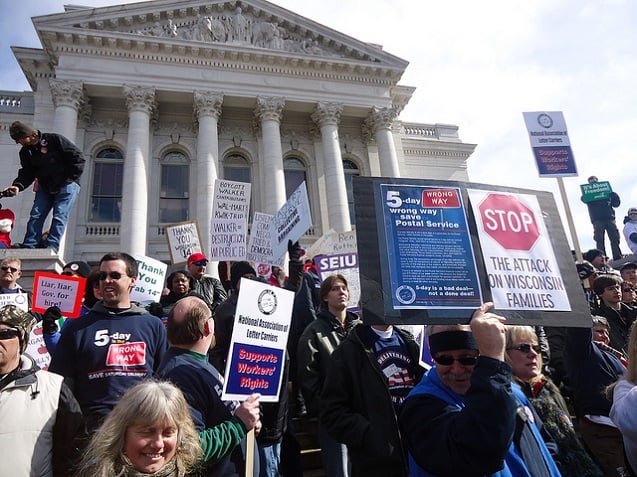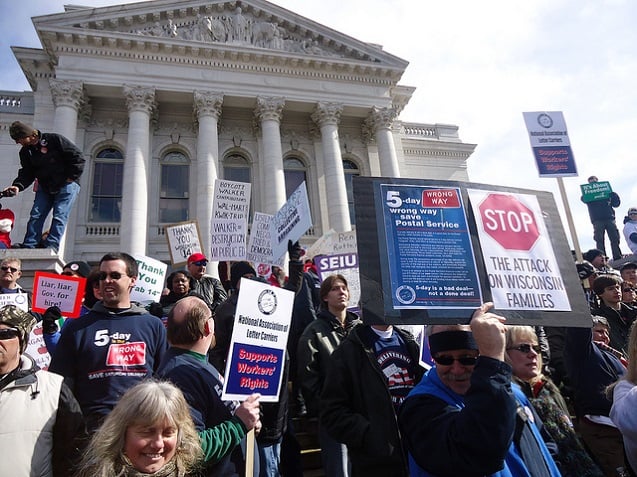
 Karen Hickey for wisaflcio / Flickr)” width=”637″ height=”477″ />Wisconsin workers rally, March 6, 2011. (Photo: Karen Hickey for wisaflcio / Flickr)
Karen Hickey for wisaflcio / Flickr)” width=”637″ height=”477″ />Wisconsin workers rally, March 6, 2011. (Photo: Karen Hickey for wisaflcio / Flickr)
The GOP offensive against public sector unions at the state level that began in earnest in Wisconsin and Ohio in early 2011 is far from over. In its more recent manifestation, Republican politicians in Missouri and Pennsylvania are once again promoting so-called “paycheck protection” legislation, which they claim will protect the interests of ordinary workers. Nothing could be further from the truth. In common with similar legislation that right-wing groups have promoted for the past two decades, the goal of this legislation is to silence the political voice of working people and ensure that the wealthy dominate state elections.
Paycheck “Protection” Has Always Been a Partisan Right-Wing Ploy
Along with legislation restricting public sector bargaining and right-to-work laws, paycheck protection legislation – which either restricts unions’ ability to raise or spend money on politics – has been one of the main anti-union initiatives that conservative activists have promoted at the state level. Starting with the very first legislation in Washington State in 1992, a state-level network of right-wing organizations promoted paycheck legislation through ballot initiatives and bills. Paycheck legislation has always been a cynical attempt to tilt the balance of political power in favor of right-wing politicians who promote that legislation, not an effort to protect individual union members and non-union employees. In 1998, President Clinton explained that paycheck is a partisan power solution in search of an imaginary problem: “This is an attempt to create the impression that workers are being put upon when they aren’t. And it’s being done to alter the balance of power in the political debate.”
Union members and non-members already enjoy a well-established legal right not to contribute to union political spending. Unions cannot force employees to have money for representation or political activities automatically deducted from their paycheck without authorization. Paycheck-protection legislation does not provide workers’ with any rights they do not currently enjoy, but it deprives choice from workers who want a union with an effective political voice. In the name of solicitude for workers, disingenuous paycheck measures aim to take working people out of politics. In common with earlier paycheck measures, current paycheck bills in Pennsylvania and Missouri are based on model legislation devised by the ultra-conservative American Legislative Exchange Council (ALEC).
In the past few years, right-wing organizations and activists have promoted bills targeting automatic dues deduction in well over a dozen states. They have succeeded in enacting legislation in Wisconsin, North Carolina (for school employees), Michigan (for school employees and child care providers) and have had partial successes in other states. Whenever they are put to the electorate, however, paycheck measures almost always lose – they have lost three times in California in the past 15 years – because voters recognize that they are a cynical ploy. In a 2013 campaign for protection legislation in Kansas, a right-wing lobbyist explained that he “needed this bill passed so we can get rid of public sector unions.”
Corporate Political Money Is the Real Problem
The battle over political spending has intensified after the Supreme Court’s 2010 Citizens United decision, which stated that corporations and unions have a constitutional right to make unlimited independent expenditures, so long as they are not coordinated with candidates’ campaigns. Although they are vastly outspent, unions are the only organized group whose political expenditures are anywhere near the level of spending by powerful corporations and conservative billionaires, which is why right-wing groups target them.
Moreover, unions are the most transparent organizations in the country when it comes to spending on politics. Unions file detailed reports with the Labor Department that disclose a broad range of activities related to politics, including polling fees, money spent on internal political communications, and even the cost of bratwursts used to feed workers protesting Wisconsin’s controversial law eliminating public sector bargaining at the state capitol in early 2011. Powerful corporations, in contrast, do not disclose a broad range of their political spending activities. Unlike union members and non-union employees – whose right to opt out of political spending is protected by law – employees, customers, and shareholders have no legal right to opt out of paying for corporate political expenditures. The same groups that have promoted paycheck protection measures have opposed giving shareholders opt-out rights when it comes to corporate spending on politics.
As Harvard Law Professor Ben Sachs has pointed out, most public employees, who have no legal right to opt out, help fund corporate political speech. Public sector employees are forced to subsidize corporate political speech through pension contributions – they “cannot choose stock or avoid compelled speech associated with stock choices” – but no employee is ever forced to subsidize union political speech. In addition, corporations spend most of their political funds on external lobbying, while unions spend more on internal political communications with their members. This lack of transparency is especially significant because in recent years, corporations and conservative billionaires have vastly outspent unions in both state and national politics.
In the past, right-wing supporters of paycheck protection have stated that this type of legislation will “enable us to break the unions” and “crush labor unions as a political entity.” Paycheck bills are part of a nationwide assault on public sector unions and a nationwide strategy to diminish the political voice of working people. Paycheck protection is bad for Missouri and bad for Pennsylvania and should be rejected.
Join us in defending the truth before it’s too late
The future of independent journalism is uncertain, and the consequences of losing it are too grave to ignore. To ensure Truthout remains safe, strong, and free, we need to raise $44,000 in the next 6 days. Every dollar raised goes directly toward the costs of producing news you can trust.
Please give what you can — because by supporting us with a tax-deductible donation, you’re not just preserving a source of news, you’re helping to safeguard what’s left of our democracy.